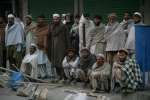- Text size
 |
|  |
|  |
| 
- عربي
Germany: Confronting challenges at end of the road
News Stories, 20 October 2015
BERLIN, Germany (UNHCR) – Selwa sighed heavily sitting on a mattress with Renham, her energetic seven-year old daughter. The farmer abandoned her treasured land, livestock, fruit trees and two elder children, to make the dangerous journey from the Ghouta suburbs outside the Syrian capital Damascus, to Germany.
Selwa and her family have found a space to rest in a new makeshift emergency refugee reception centre at Berlin's landmark 'Internationales Congress Centrum' complex, renowned for trade fairs and sporting events. Ingenuity has made up for Germany's housing shortfall, and authorities say as many as 1,000 refugees could sleep here in the coming weeks.
The area is quiet around midday as most refugees spend the time registering their status at Berlin's Office for Public Health and Social Affairs, nicknamed "LaGeSo". Workers and volunteers unload bunk beds, build dividing walls and supervise the lunch. They are still waiting for showers to be installed.
A chemical gas attack in Ghouta over two years ago that killed 12 relatives forced Selwa to flee, first to another neighborhood, and then to Europe. "A lot of families died from the attack," she said sadly. "They went to sleep and didn't wake up."
In downtown Berlin, Selwa's terrifying story is a common one amidst the long lines of refugees gathered around the entrance to LaGeSo. Hundreds of individuals and families from Syria, Iraq, and Afghanistan wait here, often sleeping overnight, to keep their place in line to register as asylum-seekers.
In a cheap and crowded Turkish restaurant nearby, an exhausted middle-age man called Bassam was close to tears. He had left his family behind in Syria, intending to bring them over to Germany after he had found a home and a job. Having spent twenty days sleeping outside the centre he has run out of money and still does not have a registration number.
The numbers of asylum-seekers arriving in Berlin has doubled since 2012 and spiked this year according to LaGeSo spokeswoman Silvia Kostner. Stretched staff at LaGeSo now process up to 400 cases a day by registering them, figuring out where they will sleep, and distributing medical cards and transportation passes. Asylum seekers then report to the Federal Office for Migration and Refugees (BAMF) in Berlin's Spandau neighborhood, which now has over 300,000 open cases.
Amidst the crowds German volunteers distribute hot meals, water, and warm clothes or hang out and give advice. The country is expecting to receive hundreds of thousands of new asylum-seekers this year. "What is really amazing is Germany's preparedness to help," said Roland Bank of the UNHCR office in Berlin. "These are all well-meaning volunteers donating their free time, and giving empathy and support."
In a park besides the LaGeSo building, an Iraqi family from Saladin lay back on the grass next to their suitcases and tent, and talked to a family from Baghdad. Their mood was upbeat, even though they had already spent nine days waiting for an appointment to register as asylum-seeker.
They fled after militants attacked their hometown north of Baghdad. "We couldn't say goodbye to anyone," said Sara, with her sick husband Walid and son Qatada sitting next to her. "Because if it's known you are headed to Europe, someone might try and kill you for your money."
The family survived the grueling journey to Greece and traveled overland as far as Austria. But their luck turned for the worse when they took the wrong train out of Vienna and ended up spending over two months in a Slovakian prison.
"It is so good to be in Germany," exclaimed Sara, as she stretched her arms out on a warm afternoon. Walid and Qatada smiled at her. "We feel free."
















































